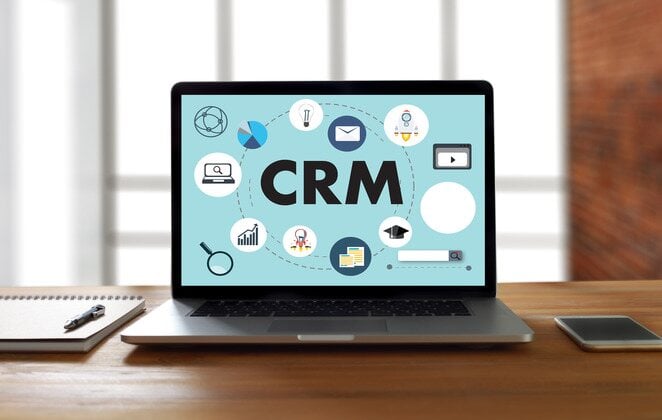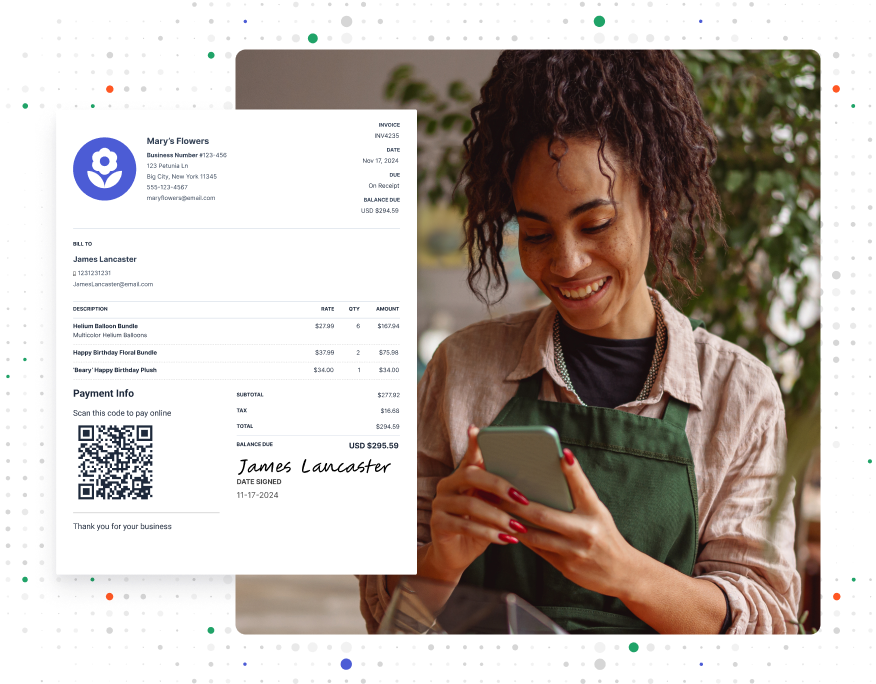What Is CRM and How to Find the Best Option for a Small Business

Having more clients is a great thing—until you’re drowning in paperwork and losing track of who purchased what.
For many small businesses, the biggest obstacle to growth is keeping everything straight. Struggling to keep up with customer information as you scale is part of that picture.
Investing in a customer relationship management (CRM) system might be what you need to organize operations. Here are the basics of CRM systems and how a CRM can transform your business operations.
RELATED ARTICLE — The Top Financial KPIs To Monitor for Your Business
What Is CRM?
Customer relationship management systems, called CRMs, are powerful tools to manage client data. They track interactions and customer information, from phone numbers to payment information. Modern CRMs have features that let you:
- Send automatic emails for appointment reminders or promotions.
- Keep an eye on potential sales (also called leads).
- Look at data to predict future sales.
- Give you insight into customer purchasing patterns.
What does CRM do for a business?
For small businesses, using CRM improves customer service and increases sales. It can also shape marketing plans by determining which customers are most likely to purchase a service.
Imagine you’re a freelance web designer. Your CRM would store the details of which clients you built websites with on a particular platform. Then, that platform releases a security update. Your CRM can help you email all of those clients with a promotional offer to confirm their site is secure.
Or, you could track which customers were interested in your services but chose to pass. During slow periods, you could contact that list to offer discounted services to fill your time.
If you work on a team, any team member can look up a client’s file in the CRM to learn the details of their relationship with the business. A client reporting a problem with their website can be helped by any designer at the company, thanks to a detailed customer history.
RELATED ARTICLE — What Is Customer Relations? Everything You Need To Know for Your Business
Why Do Small Businesses Need a CRM System?

A CRM can bring order to your operations and improve customer relationships. But is it necessary for every small business?
Not all small businesses want or need a CRM. If you’re not looking to expand your business and are managing things well, a CRM might not be necessary.
However, if you aim to grow your business or improve how you communicate with customers, a CRM is a very valuable tool. A survey of small businesses showed that 74% experienced improved customer relationships after using a CRM. Better customer relationships lead to more sales, improving your cash flow. That makes it easier to scale your business even further.
RELATED ARTICLE — Communication Methods Within a Business and How To Improve Your Skills
How Do CRM Systems Work?
A CRM acts as a central database for client information. Every department can access the system to search and add information about different files.
The best CRM systems track every interaction your company has with a customer. That includes every sales call, email exchange, or service request. Platforms then link this information to other relevant finance, marketing, inventory, and sales data. This creates a clear view of each customer’s relationship with your business.
For example, if a service agent spots an upsell opportunity during a routine support call, the CRM system records this information in real time. The system then updates the customer’s record and alerts the sales team of their interest so no opportunity slips through the cracks.
CRM Systems for Small Businesses: 3 Benefits
A CRM system is a game-changer for small businesses. Here’s more about the benefits of implementing one.
1. Improvement in Customer Service
A CRM stores all your customer information in one place. This means quicker access to customer histories and faster response times.
2. Enhanced Marketing Campaigns
You can better understand your customers’ behaviors and preferences with a CRM. The systems track data and can generate reports with insights about purchase history and service requests. This data lets you target audiences strategically.
3. Streamlined Business Processes
CRMs automate repetitive tasks like data entry and appointment scheduling. This speeds up workflows and reduces the chances of human error.
FROM ONE OF OUR PARTNERS — What to Consider when Choosing a CRM
3 Potential Drawbacks of CRM Systems
While CRM systems offer many benefits, it’s smart to be aware of potential challenges. These systems are complex, and employees need time to learn how to use them. Below are some potential drawbacks to consider before purchasing a CRM system.
1. Costs
While many CRMs offer free trials or starter plans, these may only include some of the features you need. Extra charges for customization, implementation, training, and ongoing support may exist. Assessing the total cost of ownership is essential to see if it aligns with your budget and needs.
2. Complexity
CRMs have a learning curve. Look for easy platforms that can become more sophisticated over time. It’s important to ensure that all employees can use the CRM.
3. Challenges of Integration
Integrating a CRM with existing systems can be challenging if there are compatibility issues or data migration concerns. Poor integration disrupts workflows and reduces the CRM’s effectiveness.
Newer CRM systems are more user-friendly and scalable, so they cater to smaller companies that might not have IT resources but still need CRM features to grow their business.
RELATED ARTICLE — Chart of Accounts: Sample, Definition, and Guide
10 Features to Look for in CRM Systems for Small Businesses

Implementing a CRM is a turning point for a small business. Here are 10 crucial features to consider so you find a system that aligns with business needs:
- Scalability. As your business grows, a CRM should grow with you. Look for a system that offers flexible features and pricing. You’ll want a system that can expand without requiring a complete system overhaul.
- Automation. Reduce manual tasks with a CRM that automates repetitive activities like data entry and email scheduling. This boosts efficiency and lets your team focus on more strategic tasks.
- Integration. Choose a CRM that integrates with other tools, such as email, social media, and accounting software. This ensures a smooth workflow and centralizes operations.
- Customer Support. Customer support tools like live chat and chatbots within the CRM help you manage customer inquiries faster.
- Accessibility. You want a CRM accessible on many devices, including desktops and mobile phones. This way, you can manage customer relationships on the go and from any location.
- Technical Requirements. Consider the CRM system’s technical demands. You want a system that matches your business’s IT capabilities and doesn’t need excessive technical resources.
- Customization. A CRM should be adaptable. Look for one that allows you to customize features such as dashboards, reports, and templates.
- Tools. Your CRM should provide tools that manage the customer lifecycle. This includes email marketing, lead management, and analytics to track customer engagement.
- Features. Check the features offered by the CRM. Look for helpful tools like contact management and sales forecasting.
- Pricing. Consider the CRM’s pricing structure. It should be clear and scalable, offering options that suit small businesses without hidden costs.
FROM ONE OF OUR PARTNERS — Does Your Small Business Need a CRM System?
Save Time With Saved Invoice Items
Having the right CRM in place saves your team hours of busy work—and so does the right invoicing software.
With Invoice Simple, you can save service, payment, and client details for future reference. You can also issue estimates and invoices from your phone. That means you can quickly generate these documents from your database and respond to client requests in minutes.
Start Your First
Invoice Today
Create customized and professional
invoices and connect with clients
